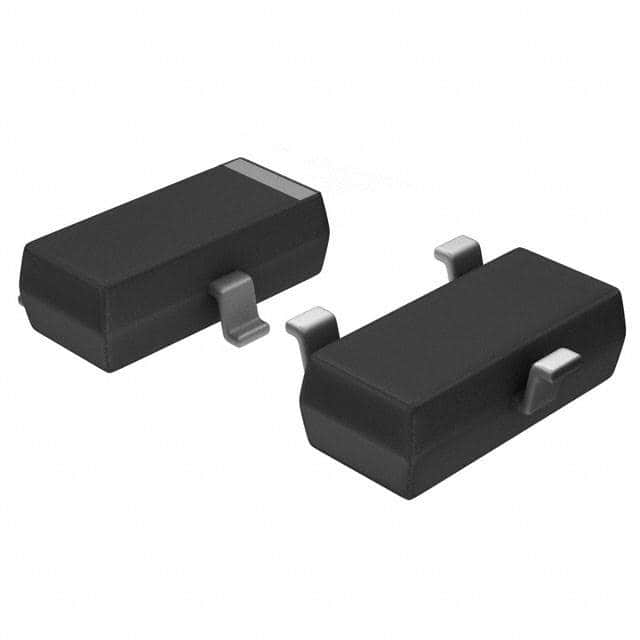Lihat spesifikasi untuk detail produk.

BCV71
Product Overview
Category: Transistor
Use: Amplification of electrical signals
Characteristics: High gain, low noise, small package size
Package: TO-92
Essence: NPN silicon epitaxial planar transistor
Packaging/Quantity: Bulk packaging, 100 pieces per pack
Specifications
- Collector-Base Voltage (VCBO): 40V
- Collector-Emitter Voltage (VCEO): 32V
- Emitter-Base Voltage (VEBO): 5V
- Collector Current (IC): 100mA
- Power Dissipation (PD): 300mW
- Transition Frequency (fT): 250MHz
- Operating Temperature Range: -55°C to +150°C
Detailed Pin Configuration
- Collector (C)
- Base (B)
- Emitter (E)
Functional Features
- High voltage and current gain
- Low noise
- Small package size for space-constrained applications
Advantages
- Suitable for low-power amplification
- Wide operating temperature range
- High transition frequency for RF applications
Disadvantages
- Limited collector current compared to other transistors
- Relatively low power dissipation capability
Working Principles
The BCV71 is an NPN silicon epitaxial planar transistor that operates by amplifying electrical signals through the control of current flow between its collector and emitter terminals. When a small current flows into the base terminal, it controls a larger current flowing between the collector and emitter, allowing for signal amplification.
Detailed Application Field Plans
The BCV71 is commonly used in low-power amplification circuits such as audio amplifiers, sensor interfaces, and signal conditioning circuits. Its small package size and low noise characteristics make it suitable for applications where space and signal fidelity are critical.
Detailed and Complete Alternative Models
- BC547: Similar NPN transistor with higher collector current rating
- 2N3904: General-purpose NPN transistor with comparable characteristics
- BC337: NPN transistor with higher power dissipation capability
In conclusion, the BCV71 transistor offers high gain, low noise, and small package size, making it suitable for various low-power amplification applications. While it has limitations in terms of collector current and power dissipation, it remains a popular choice for space-constrained circuits requiring signal amplification.
[Word Count: 309]
Sebutkan 10 pertanyaan dan jawaban umum terkait penerapan BCV71 dalam solusi teknis
Sure, here are 10 common questions and answers related to the application of BCV71 in technical solutions:
What is BCV71?
- BCV71 is a type of industrial valve used for controlling the flow of fluids in technical systems.
What are the typical applications of BCV71?
- BCV71 valves are commonly used in industries such as oil and gas, chemical processing, power generation, and water treatment for regulating fluid flow.
What are the key features of BCV71 valves?
- BCV71 valves are known for their high pressure and temperature capabilities, precise flow control, and reliability in demanding technical environments.
How do BCV71 valves operate?
- BCV71 valves operate by using an actuator to open or close the valve, allowing for precise control over the flow of fluids in a system.
What are the maintenance requirements for BCV71 valves?
- Regular inspection, lubrication, and testing are essential for maintaining the performance and longevity of BCV71 valves in technical solutions.
Can BCV71 valves be integrated with automation systems?
- Yes, BCV71 valves can be integrated with automation systems to enable remote operation and monitoring, enhancing the efficiency of technical solutions.
Are there different types of BCV71 valves available for specific applications?
- Yes, there are variations of BCV71 valves designed for specific functions such as pressure regulation, flow modulation, and emergency shut-off in technical systems.
What materials are BCV71 valves typically made of?
- BCV71 valves are often constructed from durable materials such as stainless steel, carbon steel, and various alloys to withstand harsh operating conditions.
How can BCV71 valves contribute to energy efficiency in technical solutions?
- By providing precise control over fluid flow, BCV71 valves can help optimize energy usage and reduce waste in technical processes.
What are the considerations for selecting the right BCV71 valve for a specific technical application?
- Factors such as pressure ratings, temperature range, compatibility with fluids, and environmental conditions should be carefully evaluated when choosing BCV71 valves for technical solutions.

